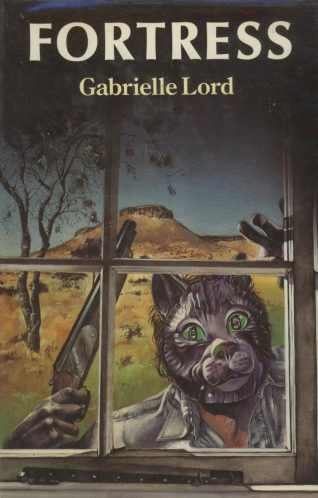 By GABRIELLE LORD (Ballantine; 1980)
By GABRIELLE LORD (Ballantine; 1980)
I’ll always remember the 1985 movie adapted from this novel, which creeped the Hell out of me when it was broadcast on HBO in the mid-eighties. The book, it turns out, is just as potent. It was the first novel by Australia’s Gabrielle Lord, who based the story on an actual crime that occurred in Australia. How closely Lord hews to the particulars of that crime I don’t know, but her narrative is appropriately spare and suspenseful, with many strikingly gruesome details.
The early passages of FORTRESS, detailing how the young schoolteacher Sally is forced by the Australian government to teach in a tiny outback school to obtain her degree, are right out of a Kenneth Cook novel in their gritty realism. But things quickly turn dark and fanciful with the appearance of a band of gun-wielding scumbags, led by a psychopath in a Father Christmas (a.k.a. Santa Claus) mask. They kidnap Sally and her students with the idea of collecting a million dollar ransom, dragging them through miles of untamed Australian wilderness—an appropriate backdrop to the increasing brutality of the proceedings.
Sally’s situation is vividly and horrifically portrayed as she finds herself thrust into a nightmare while having to stay strong for her young charges. Luckily the kidnappers are among the dumbest who’ve ever lived, first shutting their captives up in a cave with a tunnel through which Sally and the kids escape, and then, following a second escape, allowing them to hide out in another cave. On this occasion the bad guys moronically tell Sally early in the morning that they’ll be back in the evening, thus giving her and the kids a convenient time frame to figure out how to strike back against their tormentors and construct the titular fortress.
Believability, or lack thereof, is a major issue with this novel (as it was in the film version). It’s so brilliantly written and plotted, however, that I was willing to nearly overlook that its shortcomings. The novel also contains some startling brutality, particularly in the unforgettable final pages, which in their macabre nastiness tip the proceedings into horror territory.
